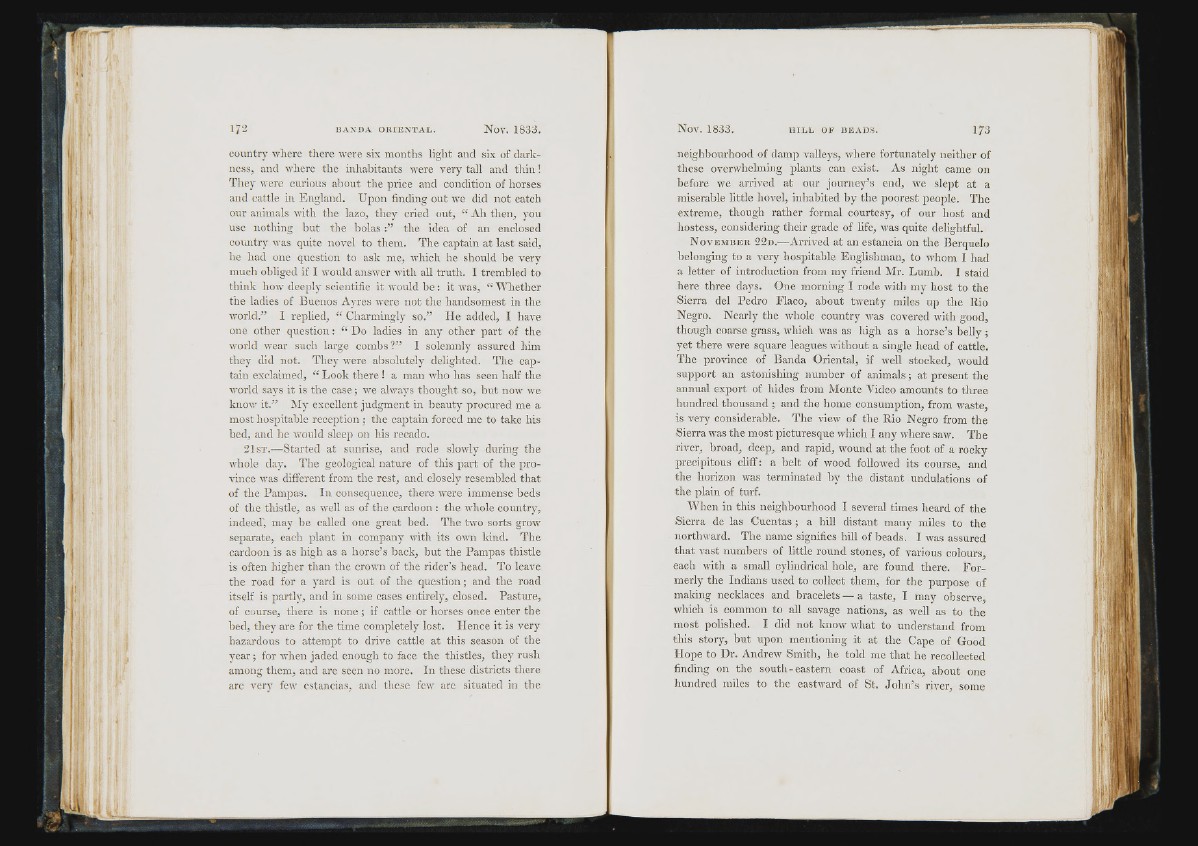
country wliere there were six months light and six of darkness,
and where the inhabitants were very tall and tliin !
They were curious about the price and condition of horses
and cattle in England. Upon finding out we did not catch
our animals with the lazo, they cried out, “ Ah then, you
use nothing but the b o l a s t h e idea of an enclosed
country was quite novel to them. The captain at last said,
he had one question to ask me, which he should he very
much obliged if I would answer with all truth. I trembled to
think how deeply scientific it ivould be : it was, “ Whether
the ladies of Buenos Ayres were not the handsomest in the
world.” I replied, “ Charmingly so.” He added, I have
one other question: “ Do ladies in any other part of the
world wear such large combs ?” I solemnly assured him
they did not. They were absolutely delighted. The captain
exclaimed, “ Look there ! a man who has seen half the
world says it is the case; we always thought so, but now we
know it.” Wy excellent judgment in beauty procured me a
most hospitable reception ; the captain forced me to take his
bed, and he would sleep on his recado.
2 1 s t .—Started at sunrise, and rode slowly during the
whole day. The geological nature of this part of the province
was different from the rest, and closely resembled that
of the Pampas. In consequence, there were immense beds
of the thistle, as well as of the cardoon : the whole country,
indeed', may be called one great bed. The two sorts grow
separate, each plant in company with its own kind. The
cardoon is as high as a horse’s back, but the Pampas thistle
is often higher than the crown of the rider’s head. To leave
the road for a yard is out of the question; and the road
itself is partly, and in some cases entirely, closed. Pasture,
of course, there is n on e ; if cattle or horses once enter the
bed, they are for the time completely lost. Hence it is very
hazardous to attempt to drive cattle at this season of the
year; for when jaded enough to face the thistles, they rush
among them, and are seen no more. In these districts there
are very few estancias, and these few arc situated in the
neighbourhood of damp valleys, where fortunately neither of
these overwhelming plants can exist. As night came on
before we arrived at our journey’s end, we slept at a
miserable little hovel, inhabited by the poorest people. The
extreme, though rather formal courtesy, of our host and
hostess, considering tlieir grade of life, was quite delightful.
N o v e m b e r 2 2 d .—Arrived at an estancia on the Berquelo
belonging to a very hospitable Englishman, to whom I had
a letter of introduction from my friend Mr. Lumb. I staid
here three days. One morning I rode with my host to the
Sierra del Pedro Flaco, about twenty miles up the Rio
Negro. Nearly the whole country was covered with good,
though coarse grass, which was as liigh as a horse’s belly ;
yet there were square leagues without a single head of cattle.
The province of Banda Oriental, if well stocked, would
support an astonishing number of animals; at present the
annual export of hides from Monte Video amounts to three
hundred thousand ; and the home consumption, from waste,
is very considerable. The view of the Rio Negro from the
Sierra was the most picturesque which I any where saw. The
river, broad, deep, and rapid, wound at the foot of a rocky
precipitous cliff: a belt of wood followed its course, and
the horizon was terminated by the distant undulations of
the plain of turf.
AVhen in this neighbourhood I several times heard of the
Sierra de las Cuentas; a hill distant many miles to the
northward. The name signifies hill of beads, I was assured
that vast numbers of little round stones, of various colours,
each with a small cylindrical hole, are found tliere. Formerly
the Indians used to collect them, for the purpose of
making necklaces and bracelets — a taste, I may observe,
which is common to all savage nations, as well as to the
most polished. I did not know what to understand from
this story, but upon mentioning it at the Cape of Good
Hope to Dr. Andrew Smith, he told me that he recollected
finding on the south-eastern coast of Africa, about one
hundred miles to the eastward of St. John’s river, some